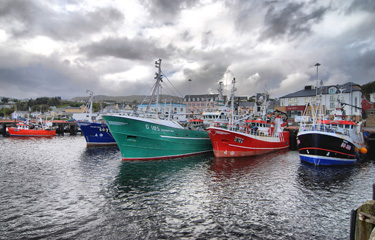An EUR 80 million (USD 79.8 million million) scheme to retire a third of the Irish fishing fleet won’t have the effect of preserving fish stocks and needs to be accompanied by a plan to make the sector “greener and more innovative,” according to the Irish Fish Producers Organisation (IFPO), a fishing representative body.
On 28 July, 2022, Ireland Minister for Agriculture, Food and the Marine, Charlie McConalogue confirmed the Irish government will move forward with a recommendation from Ireland’s Seafood Task Force to “help restore balance between fishing fleet capacity and available quotas, following the reductions in quotas for stocks arising from the E.U./U.K. Trade and Cooperation Agreement.”
The plan targets the voluntary decommissioning of vessels with total capacity of up to 8,000 gross tons and 21,000 kilowatts, offering owners a premium of up to EUR 12,000 (USD 11,968) per gross ton and crew members up to EUR 50,000 (USD 49,868) each.
“The overall package of measures that are being implemented on foot of the Seafood Task Force recommendations will contribute to the long-term viability of the fishing fleet, the wider seafood sector and the coastal communities dependent upon it,” McConalogue said in a statement.
IFPO CEO Aodh O’Donnell said Irish fish producers are being forced out of business due to overly small and unfair quotas and high fuel costs. He estimated 60 Irish trawlers will be scrapped under the latest decommissioning scheme, which
O’Donnell said Ireland’s fleet has struggled after losing fishing quotas due to Brexit, which he said resulted in a redrawing of quotas that unfairly benefitted other European Union states, including the offering of quota to fish in Irish waters to other E.U. states.
Ireland has the “best and most-productive waters in Europe,” O’Donnell said.
“Others have been able to exploit resources in our rich waters," he said.
As a result, the value of Irish fish processing has dropped to below that of other E.U. states with much shorter coastlines, like Belgium and Germany, O’Donnell said.
“Over the last eight years, the Irish fishing industry has fallen from third-highest [production value] in Europe to tenth place,” O’Donnell said in a statement to SeafoodSource. “We are constantly losing out to other E.U. states.”
O’Donnell criticized the Irish government for failing to obtain more fuel subsidies from the E.U.
“Rising fuel costs have been offset in other European countries by a 30 percent [of total fuel cost] fuel subsidy from the E.U. But the Irish government … refused to pass on these subsidies, leaving us at a competitive disadvantage,” he said.
O'Donnell said he sees the new scheme reducing the Irish fleet – some of which was built with grants from the E.U. – to a third of its 2006 size, and he wants government to now come up with “positive coherent policies for the longer-term development of the fishing industry” and a vision that “addresses global green agenda and creates a safer and more innovative industry.”
Photo courtesy of Helioscribe/Shutterstock







